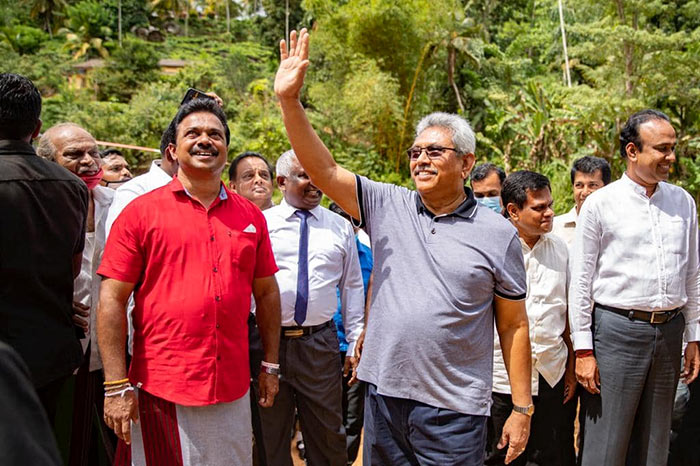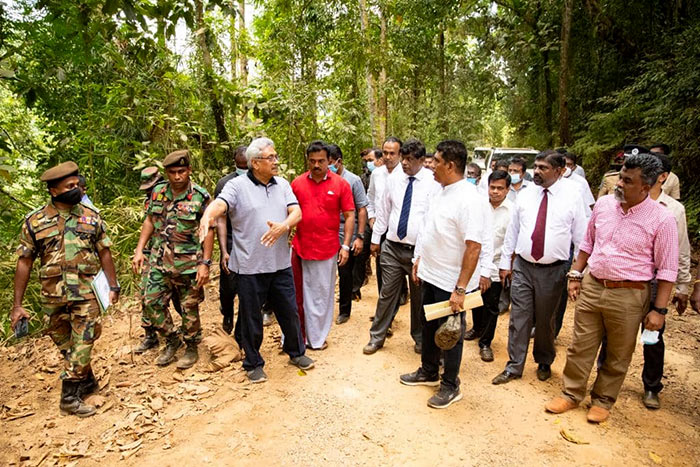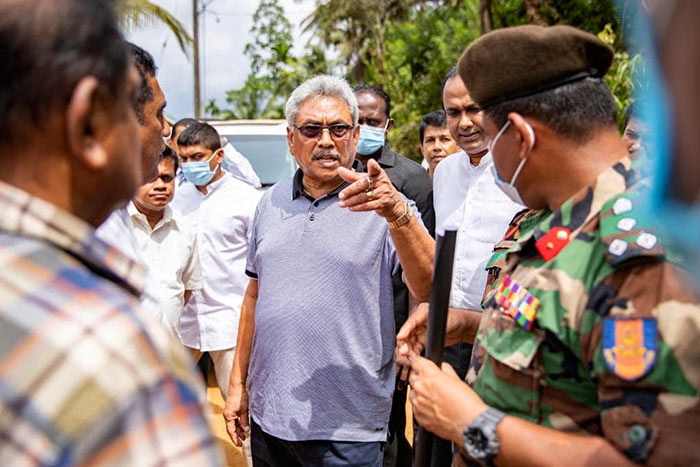Neluwa-Lankagama road renovation without harming environment – President

President Gotabaya Rajapaksa inspected the renovation of the Neluwa-Lankagama road today (29) and spoke to the stakeholders about allegations that the work is harming the Sinharaja forest.
President has insisted that the construction of the Neluwa-Lankagama road should not cause environmental damages.
Officials of the road development, wildlife, environment and other relevant ministries joined in the inspection.
On the occasion, President Rajapaksa said the long-standing requirement for a road for the villagers should be met while safeguarding the environment.
Lankagama is an ancient village that dates back to the reign of King Walagamba and the main livelihood of its inhabitants is tea cultivation.
They take their produce to Deniyaya and Neluwa via a road that is located close to the Sinharaja.
Also, patients going to hospitals and schoolchildren widely use this road.
The Army is renovating the 18 km long road under RDA supervision to make the present nearly four hour journey shortened to a mere 45 minutes.
A bus will play on the road between Neluwa and Deniyaya once work is completed within 90 days.
A suspension bridge at Lankagama will be replaced with a bridge 120-feet in length and six-feet wide.
The president also instructed that reforestation there be encouraged by providing each of the 700 families of Lankagama with three plants each free of charge.


Latest Headlines in Sri Lanka
- Six police officers arrested over alleged priest assault granted bail January 29, 2026
- Sri Lanka moves toward ‘Dream School’ system for all grades January 29, 2026
- ASP Rohan Olugala appointed Director of Walana Anti Corruption Unit January 29, 2026
- Sri Lanka launches five-year national action plan to combat human trafficking January 29, 2026
- Équité launches media guidelines to protect LGBTIQ+ rights in Sri Lanka January 28, 2026



It is important that the President visited the site and has clarified the position re the renovation of an already existing road. However, what is not clear is why officials of departments of road development, forest and environment complained. It is also interesting to know WHO gave the order to the SL Army to start the renovation ??? Perhaps the Army Commander will oblige
According to new knowledge, when you construct roads adjacent to forest reserve and/or conservation sites , people encroach them, cultivate, and extract forest products and timber illegally. That is happening in Brazil and other biologically rich countries.
But unfortunately Sri Lankan scientists who are close with politicians are dormant and poor in knowledge to convince politicians. So is institutions. Central Environmental Authority is totally politicized: chairman and DG are appointed by the Minister and officials are same. They have a weak voice or no voice in most cases.
University professor enjoy the benefits including Rs. 400 thousand salary.
God bless my country.
This is utter stupidity. You don’t need a road for 200 families. Within next 10 years it will be 300 families! Best thing would have been relocating these folks some where else. Remember when Kothmale dam was constructed how many ancient villages vanished! All the families dwelling there were relocated.
Well said Amarakoon, there is a hidden agenda in constructing this raod.
This action sends a clear message to all professionals.
“We will do what we want to do; no obstructions, please”.
In Ranjith’s words, SL Professionals are better off sweeping streets and cleaning toilets in overseas lands.
Not according to president and people in village Lankagama, the existing road has to be developed. According to latest published research, this renovation or development of the road is not . at all, acceptable.
However, unfortunately Forest Dept., Dept. of Wildlife conservation, Central Environmental Authority people are poor in knowledge and have a weak pale voice. They have to be, I honestly assume, rehabilitated along with NGOs .They have common values and opinions as laymen in this country do. So are university professors in most cases.
That is why , for example, we can’t find a solution for human-elephant conflict.